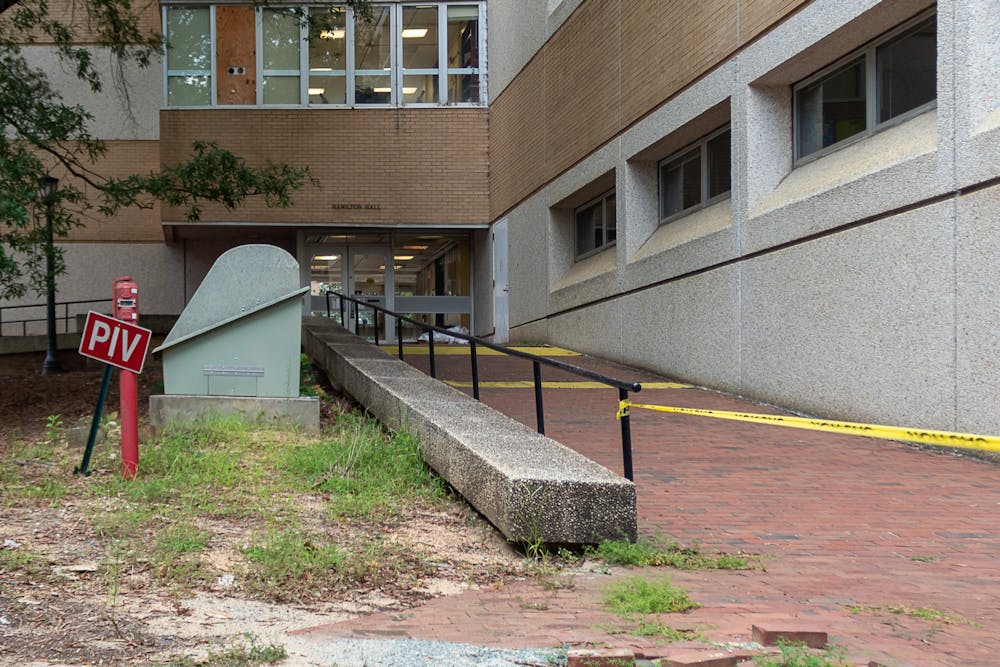History Professor Harry Watson has taught at UNC for over 45 years. He said the elevators have been unreliable for as long as he can remember.
“It's horrible,” Watson said. “I honestly think that this is a reflection of the low value that the legislature places on higher education and education in general, actually.”
Watson said while he did not think those in control are being consciously cruel, but instead are just thoughtless. Regardless, he said the consequences are the same.
“It says that whoever controls the money is not as worried about the access of disabled people, faculty and students and visitors and everybody else who have mobility issues,” Watson said. “The people who control the money just aren't as concerned about their access to education as other people.”
UNC Media Relations said addressing the backlog of deferred maintenance remains a priority for the University, but cited supply chain issues and staff vacancies as factors impacting repairs. No timeline was provided for the repair of Hamilton Hall's elevators.
Bolton said she felt like the University was failing her in the most basic sense by not making the classes that she is paying for accessible.
“It was extremely disheartening, and I know I'm not the only student that's experienced things like that,” Bolton said.
When elevator shutdowns occur in academic buildings, UNC Facilities Services are responsible for notifying ARS and the Registrar’s Office, which are both tasked with accommodating students with mobility limitations.
“This campus is not at all accessible, or equitable for the things that I can access compared to able-bodied peers of mine,” Bolton said. “A lot of things that are definitely in violation of the Americans with Disabilities Act are ignored for years and years.”
'It shouldn’t matter the cost'
Bolton said that when she brings up accessibility issues with the University, she is met with conversations about how costly the solutions are.
“It’s a violation of civil rights to have those things, so it shouldn’t matter the cost,” she said.
To get the day's news and headlines in your inbox each morning, sign up for our email newsletters.
Kym Weed, a teaching assistant professor in UNC's English & Comparative Literature department who has previously taught Introduction to Disability Studies, said that, because accessibility is often not part of campus conversations, it can become invisible.
Weed cited a metaphor by disability studies scholar Jay Timothy Dolmage, saying that steep steps in front of buildings — including the likes of the South Building and Wilson Library— send a message that the University is on a higher plane positioned above everyone.
"It also quite viscerally or practically signals that disabled folks — especially folks with mobility disabilities do not belong in a space," she said. "The space was not designed for you."
UNC Media Relations said funding from the state legislature has been significantly above historic levels. Direct funding is currently going toward renovating Carrington Hall, replacing a medical education building and constructing a new Kenan-Flagler Business School building, according to an email from MR.
Over $66 million was allocated by the state for repair and renovation. The University said it will use this to replace elevators in Carroll and Dey Hall, renovate HVAC systems in Phillips and Hamilton Halls and replace the roofs of Carroll and Memorial Hall.
“The University doesn't have $900 million just sitting around, that it could spend on this,” Watson said. “This is a matter of state appropriations. The buildings belong to the state, and we shouldn't have to ask our friends to donate enough money to maintain state-owned buildings. I mean, hello. We don't do that for courthouses.”
The University is internally funding nearly $50 million toward renovating parts of Bingham Hall, the Coates Building and Morehead Chemistry Labs.
There is over $72 million in deferred plumbing maintenance, which was highlighted to the campus community on Sept. 1 when it was announced that lead was detected in multiple Wilson Library water fountains.
UNC Media Relations said there is no known instance of adverse health effects stemming from the water, and the fountains were immediately removed from service.
However, one water fountain tested had over 12 times the baseline amount of lead allowed by the Environmental Protection Agency before water systems must take action.
“It's just that the legislature does not want to spend it in this way,” Watson said. “Actually, they don't want to spend it at all. I don't think this legislature really is committed to a high level of public services.”
The North Carolina state budget currently has a $6.2 billion surplus.
N.C. House Speaker Tim Moore and Senate President Pro Tempore Phil Berger were contacted by The Daily Tar Heel for comment but did not respond by the time of publication.
@forepreston
university@dailytarheel.com




